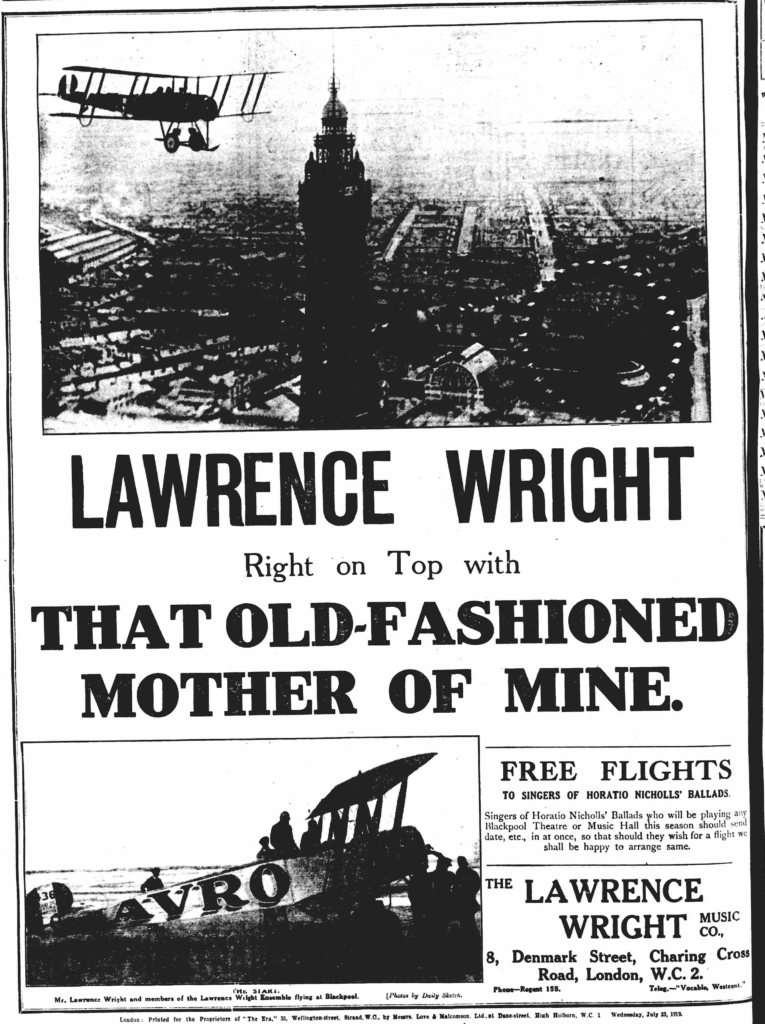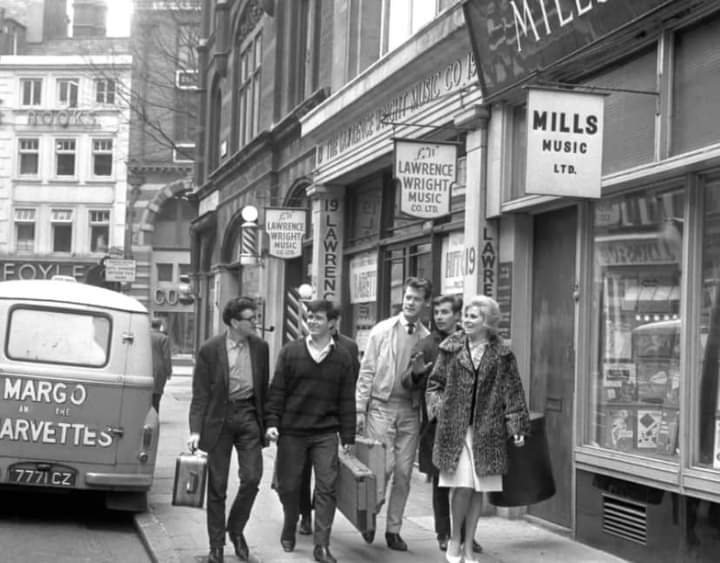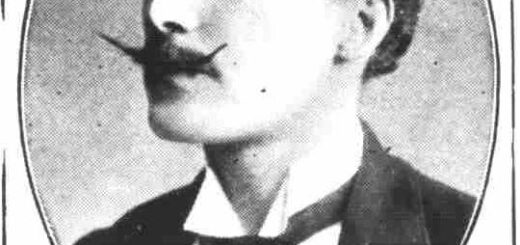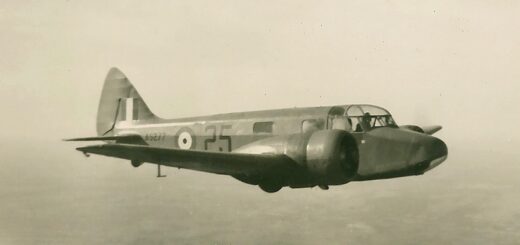Lawrence Wright, ‘Mr Tin Pan Alley’, Music Publisher, Showman, Song Writer and flamboyant publicist.
Lawrence Wright showman, song writer and publisher, ‘was to popular music as was as Edward Elgar was to classical music,’ spoken no doubt with the concept of the Land of Hope and Glory during the WW1 years when his music was significantly patriotic.
Long associated with Blackpool, and resident of the town away from his London offices, one time residing at the ‘Castle’ on North Shore Promenade and living just round the corner on Carlin Gate at the time of his death in 1964. At one time he had 20 shops in Blackpool selling his music. Now, after his death at his home in Blackpool his memory lies at Carleton cemetery in the town. This article attempts a short history of the man and his music with plenty to add in due course.
Born in Leicester in 1887, he went to St George’s school in the city. His father was a boot and shoe clicker which, consulting Wikipedia is the cutting out of the upper leathers of boots and shoes. Many of his neighbours in New Park Street in the city are in the same industry. The Wrights lived at number 80, father Charles, mother Mary and elder brother Charles. To assist the family budget there was also a boarder at the house, an Irishman, George West, who was in the same shoe making employment, as a shoe pressman.
By 1901 his father was working in his own right as a music dealer and shopkeeper. Perhaps the rhythm of the continual clicking had inspired a musical element in his personality and a change of occupation. Or perhaps it was Lawrence who had inspired his father into the business, as by seven years old he could play the violin and only a couple of years later had another four instruments at his disposal which he could play including his regular instrument, the mandolin. His elder brother is now noted as Horace on the census return a name, which way from its short and more familiar form of Horatio was a a name Lawrence would adopt for himself as a pseudonym later on in the progression of his career as well as the adopted surname of Nicholls his mother’s pre-married name. He also used Gene Williams as a nom de plume and probably others. In his own admission, as Horatio Nicholls as a pseudonym, it would make him appear less conceited to publishers than if he published in his own name – and it was a long time before anybody knew his real identity.
As a 13 year old boy he has found work as a printer’s errand boy, so from grass roots upwards he is gaining a working knowledge of the publishing industry. By 1907 the family is now at number 21 Conduit Street, and the shop is named The Highlands Music Depot, under the name of the Lawrence Wright Music Co which in a commercial part of the city shares similar shop keeping neighbours. Here the Company is advertising its song writing capabilities to all ballad vocalists and song quartets. Both father and son had progressed to here from a stall in Leicester market selling sheet music songs where Lawrence, in one article in the ‘Stage’ publication had borrowed £18 from his mother to set up a stall in the market from which he played all the popular tunes of the day on his mandolin. He also wrote his own songs which were sung by a local choir and he is described in a ‘Stage’ advert by 1906 as a ‘brilliant violinist, soloist and humourist’ and in the ‘Era’ of the same year as a ‘skilled instrumentalist’ as he occasionally took the the stage.
An insight into the nature of Lawrence’s Leicester market stall might be conjured up from a Mrs Phyllis Taylor, an invited correspondent to the centenary edition of the local Observer writing from Accrington in the March of 1987 and which gives a picture of the life of two wars, and a peek into the the entertainment on offer. She writes in her letter to the Accrington newspaper, ‘Before the age of television the evenings in winter were spent reading or singing round the piano. We learned the latest songs when we went to Blackpool during the summer. There were music stalls where men sang the songs with the words displayed on a screen. We all joined in, singing until our voices gave out. We then bought a copy of the music by Horatio Nicholls, Lawrence wright and others. Sentimental words and dreamy melodies to which we later danced in the Tower Ballroom.’ Phyllis Taylor of course, representing many others, was not privy to the full identity of Lawrence Wright.
It is thus in Leicester market where Lawrence ‘Lawrie’ Wright’s business career began. The first big hit which made his name was the publication of, ‘Don’t Go Down the Mine Daddy’, which achieved over a million sales in 1910 and written no doubt about the Whitehaven colliery disaster of that year when the Lawrence Wright Music Co contributed to the pit disaster relief fund. It was in the Wellington pit where the mines extended outwards underneath the sea where, ultimately, 147 men and boys lost their lives. From this date his Music Company gained in popularity and status and he made his money, never averse to hard and consistent work and even later in life was always at the office punctually by 8.30am. In 1911 he was able to donate half the profits of his new song, ‘Heroes of the Mine’ to the Lancashire mine disaster at Atherton in January. Here the death toll was 344. He was a man who always respected hard work of whatever nature and in his metier of music publisher and song writer no doubt retained the ability to express a sensitivity and sentiment to the experiences of others. Despite his wealth and his world wide fame, he doesn’t seem that he ever allowed his sentiments to create a status which extended beyond those eager voices listening to and singing his verses at Leicester market, in his Happylands, on the pier at Blackpool.
By 1911 he has premises in London and such was the eventual success of his business that he eventually had offices in Paris and Berlin. The London premises came about when he was only 22 years old and on a business trip to London. Seeing an empty shop off Charing Cross Road on Denmark Street he ended up renting it for £1 a week, and subsequently transferring his business to the capital from his home town of Leicester. From that early date of 1911, and the first music shop opened at No 8 Denmark Street, the music industry moved into the street and it soon became known as Tin Pan Alley and Lawrence, the ‘Daddy’ of Tin Pan Alley as its first resident and at which his famous slogan was created. Here he began the Melody Maker publication which was sold off years later. It has been reported that out of the profits of this sale he took over the North Pier Pavilion at Blackpool in 1924 by which time he would have 20 shops selling his music in the town. By 1911 Lawrence is a full blown music publisher, now recently married to Edna May and living with his in-laws in Syston, Barrow upon Soar a quaint little village in Leicestershire. The marriage to Edna didn’t last as by 1933 he is married to Betty Warren, an entertainer in his pier shows. On the occasion of the crowning of the Blackpool Cliffs Rose Queen at St Stephen’s Church, the Rose Queen, 17 year old Miss Irene Marsden was crowned by Mrs Wright while Lawrence was present at the ceremony. It would be the same church, with its actor friendly vicar Bertram Freshwater, where Lawrence’s funeral service would be held.
In 1912 he wrote, along with Paul Pelham, ‘Be British’ dedicated to the heroes of the Titanic and further music now appears in early film, writing the ‘Great Air Race’. His ever popular and successful songs are in great demand for the ever popular pantomime seasons which extend though the winter months.
By 1913 there are plentiful full page spreads to advertise his songs in the industry publications such as the Era but this year the premises at 8 Denmark Street was badly damaged by a disastrous fire which cost £850 pounds some of which was not insured and the loss of three hundred thousand copies of music. By the end of the year he combines with Bert Feldman in producing music. Initially his name was to disappear from the company name in this merger, but the company in his own right as Lawrence Wright Co still persists at 8 Denmark Street, and continues to trade perhaps after a short break until the premises are repaired.
By 1914 his hits ‘sweep the country’, through a nation ripe for expressing deep and rousing sentiment in time of war. The situation was made for him, Lawrence Wright ‘booms the glorious patriotism of the country with ‘Cheer Up Molly’, ‘Are We Downhearted? No!’ first sung by Florrie Forde, it seems, when the Music Halls could stream that patriotism from the boards of its stages, were among many songs when ‘the name Lawrence Wright stands for supremacy in the song world.’ It was a time of war when everybody was in need of cheering up and distracting from the destructive events and loss of life and loves happening elsewhere. While some of the profits from the music went to various funds for the soldiers, copyright was jealously guarded but nevertheless free permission was given on occasion as Miss Ella Shields sings ‘Bravo Territorials (While Jack Is Busy On the Sea)’ in the pantomimes. And of course he would want and did make his way to Blackpool that place of entertainment which was ‘far away from the Zeppelins’ and also an ideal place for military training with its expanse of beaches and plentiful accommodation for billets. It was also a place where the spirit and the soul could be repaired with music as much as the broken and emaciated soldiers could be repaired by the medical arm of the military with its RAMC headquarters in the town. His songs are being sung in the entertainment of the town where he would make his home in some years to come and where now in 1916 the Lawrence Wright ensemble a quartet it would seem playing the popular music and songs of the day,would perform as one of its Blackpool’s venues.
In 1919 he pulls off one of his publicity stunts in Blackpool, offering free flights to any singer in Blackpool, in theatre of Music Hall who has sung his songs in the shows. All that has to be done is to write and give a desired date for the flight and off you go.

The Era July 23rd 1919. For ‘our greatest seaside impresario’ the publicity stunt to promote his new song ‘Me and Jane From a Plane’ as, along with Jack Hylton he dropped leaflets to promote the song over the sunseekers and the day trippers of the town.
Other promotional stunts included riding around Piccadilly Circus in London on a camel for his song ‘Sahara’. And for his song, ‘I’ve never Seen A Straight Banana’, he wagered that he would give anyone who could show him a straight banana £1,000. It’s not known whether anyone did or could or devised a convincing replica to fool him. In 1927 he had played his new song, ‘Shepherd Over the Hills’ to Jack Hylton over the transatlantic telephone from New York and on that same night it was produced at the Alhambra Theatre in London.
His first more permanent foothold in Blackpool appears to be on the Gynn Estate where his Happy Valley Songsters opened in 1920. It was a kind of open air mini variety concert with regular singers, and entertainers in comedy and Blackpool’s ‘popular demonstrator, Fatty Budd.’ He was obliged to move form these outdoor premises to the north of Blackpool on the amalgamation of the parish of Bispham into the burgeoning and much richer town of Blackpool which wanted to develop the area and the Happy Valley amusement area which was the scene for his concert parties was to make way for putting greens. He then moved on to the North Pier where his, ‘On With The Show’ ran from 1924 to 1956 and when it ended, it was taken over by Bernard Delfont. It was only interrupted before the war when there was a serious fire on the pier in 1938 after one of the shows. On the final day in 1956, the mayor of Blackpool described it as ‘like taking leave of an old and well-beloved schoolmaster.’ The last show which over-ran for an hour at least took place on 29th September 1956 was quite an emotional affair with a highly receptive even tearful, audience especially responding to the singing of Frankie Vaughan with ‘Nobody Cares For Me’. A well liked man, all the showbiz stars around the town assembled to wish him well and the final paragraph in the industry publication, the Stage, of October 1956 and referring to Blackpool, reads, ‘A grand trouper, a trusted friend and a fine showman has said, “au revoir” to the place to which he has brought triumphant success, for he was the first man to put on shows there on a scale challenging London and new York.’ Lawrence gave his reasons for leaving as a heavy work load and his involvement in a film about his life. Many stars featured in the pier shows, the regular names being Frank Randall, Fred Walmsley and Tessie O’Shea. The directors of the North Pier gave a dinner and a presentation to Lawrence ‘in recognition of long association with the famous holiday entertainment.
In 1938 Lawrence purchased the ‘Castle, the imposing building on the sea front as the land rises to the north and presents a coastline of cliffs of terminal moraine to the sea and which the sea back by the furious music of it severe gales always wanted to destroy until the money from the richer town of Blackpool could secure them and keep the sea front properties safe. The Castle had been built about 1906 in the style of a French chateau by Mr A Townley Knowles ( a family name of Preston heritage) for his French wife. Resident in France, when she came to view it, she didn’t want to live in it. It was a luxurious place with its Louis XVI furniture and a bathroom fitted at a cost of, ‘£400-£500’ (£39,230.50 – 49,038.13 in 2023). The Castle then remained a mystery to the residents of the town as no-one lived in it and it stood empty out on its own in an unbuilt-up area of the coast. Up until Lawrence Wright had bought it in 1933, after it was auctioned on the death of its builder’s wife, it had only been tenanted for a period of two years in total. It was the ideal purchase for the flamboyant showman and it would be his permanent home until he moved into a bungalow around the corner. He applied to the town council for planning permission to erect at first a temporary marquee for use as a theatre and for concerts for the current season and also for the erection of a permanent building for use as a theatre on land next to his residence at the ‘Castle’. This seems to have been turned down due to the desire to keep the residential nature of the area, a place devoid of businesses apart from hotels and not wanting the shop window of the town on the seafront to be turned into a ‘Central Beach sideshow’ as had happened further south in the town. So if he couldn’t expand outside it seems that he then concentrated on creating an exclusive club inside, expecting it to be open in the September of 1939 having spent £25,000 on the project which would include a French Empire style of interior design, a grill restaurant and sun parlour and spacious ballroom.
But showmanship was more protracted and elitist as demonstrated at his at gallery first described as being on Church Street in the town in which it was an attempt to inject a little culture into what could be perceived as the culture void of the celebrated Golden Mile of simplistic amusement for the masses. He had bigger premises on Central Beach and, as well as Epstein’s controversial sculpture of Adam exhibited there he had just bought for £2,000 a replica of the crown jewels to display. Epstein’s sculptures provided a sensational and controversial exhibition with many townsfolk objecting but it drew in the crowds. From the success of Adam, Lawrence Wright commissioned further sculptures and invited Jacob Epstein to Blackpool to open the exhibition in the July of 1939. Lawrence had also invited Haile Selassi to view the exhibition but perhaps the world wasn’t ready for Reggae yet. Jacob Epstein himself was disgusted at his piece being a sideshow exhibition in Blackpool and thought it was more relevant for display at the Tate or elsewhere. Lawrence had paid Jacob Epstein £20,000 for the right to exhibit his three ton stone sculpture of Adam and had offered the sculptor £15,000 for the commission of a sculpture of Eve and later on he exhibited his ‘Adam and the Angel’. But it was controversy and nakedness rather than artistic appreciation that brought in the crowds as introduced by the art on show. Perhaps it was Lawrence’s aim to show that the popular could sit side by side with the complexities of intellectual perceptions. It could certainly be bought for a price. The exhibitions of several of Epstein’s sculptures could be viewed as an ‘adults only’ for a 3d admission fee as for that of Jacob and the Angel. Adam is now at Harewood House having been bought by Lord Harewood in 1961 from Madame Tussaud’s, as the estate of Lawrence was sold off after his death.
A man liked by everybody is a difficult achievement to aspire to in life and though he was liked by most there was at least one blemish on that reputation though, it appears not as his fault. In a claim for wrongful dismissal from his North Pier ‘On With the Show’, Theresa Collins aka Tessa Deane a soprano took the claim to the Manchester Assizes. The case was found ultimately for Lawrence Wright so he didn’t have to pay the £240 if the case was found for the plaintiff. It seems she had merely spoken the words to ‘God Save the King’ as she had a sore throat and over this evident lapse there was an alleged altercation with Dave Morris (whose now lies in Carleton Cemetery in the town.) Cross examined, Lawrence Wright claimed that she had sung the song, ‘A Wonderful Thing Is Love’ that she was contracted to sing but because he refused her leave to perform for the BBC she became upset. Who was right and who was wrong?
Shortly before his death he was awarded the Ivor Novello prize for outstanding services to music and after his death his company was sold and the rights being acquired by Michael Jackson as reported.
Lawrence died in 1964 in Victoria Hospital Blackpool after falling and fracturing his thigh at his bungalow home in Carlin Gate. A funeral service was conducted at the actors’ church of St Stephen’s, not far from his home, at noon on Friday May 22nd and he was cremated at Carleton Cemetery in the town. Death was due to ‘hypostatic pneumonia due to immobilisation in bed.’
The obituary notice in the Leicester Mercury reads; ‘Wright’ (Horatio Nicholls). On May 16th, suddenly in hospital at Blackpool, Lawrence, aged 76 years, of 13 Carlin Gate Blackpool and Wright House, Denmark Street, London W.C.2. To be received into the Actors’ Chapel of the Parish Church of St Stephen on the Cliffs, Thursday May 21st at 8pm. Funeral service Friday 12 noon, prior to cremation at Carleton Crematorium, at 12.40 pm. No flowers by request. Donations in lieu, please, to the Secretary of the Variety Artistes’ Federation, 18, Charing Cross Road, London W.C.2. All enquiries, please to Taylor’s Funeral Service, 69 Holmfield road, Blackpool.

Sources and Acknowledgements, further reading.
The British Library Newspapers via findmypast and bmd’s via findmypast.
https://travelswithmyart.wordpress.com /2022/04/23/roll-up-roll-up-its-the-jacob-epstein-show/
The picture of the sculpture on its way to Blackpool outside the Leicester galleries in Irving Street, London and the adults only display on the Promenade during what appears to be 1940’s wartime.





Wonderful piece of work.